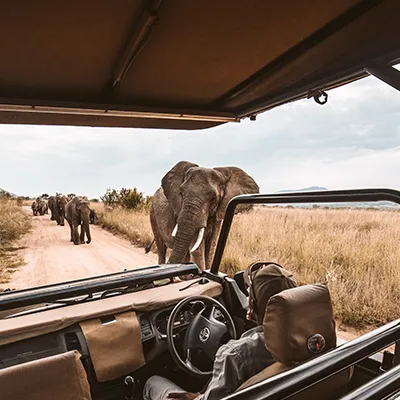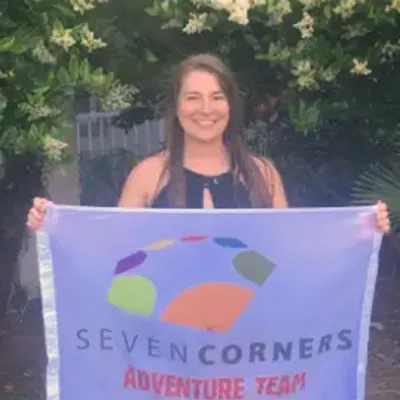Why — and How — These Travelers Bought Travel Insurance
Travel Team | Feb 21, 2023

We could talk for days about why it’s important to buy travel insurance. It probably makes more sense, though, to let real people share their true stories about why they think travel insurance is necessary and how they chose the best plan for their trip.
Why I Bought Travel Insurance
Grace

Grace was traveling to Europe for the first time since college, and, although she’s an experienced traveler, it was her first solo trip.
The autonomy of being without a student group, her family, or a tour was exciting but also a bit daunting. For the first time, she didn’t have built-in support if something went wrong.
Here is Grace’s story:
For many travelers, it’s tempting to write off travel insurance as an unnecessary luxury. “I’m healthy! What could possibly go wrong?”
But I knew that insuring my trip would be a relatively easy and cost-effective way to manage the risks of long-distance travel. Here’s what went into my decision.
First, I thought about the distance and duration of my trip. I was so excited for two dedicated weeks of summer travel, but being far from home can come with challenges.
If something serious were to happen while I was abroad — whether that’s an accident, an illness, or a natural disaster — I wouldn’t want to experience a major financial setback for adjusting my travel plans accordingly. Fortunately, that’s where my travel insurance would come into play.
Second, I factored in nonrefundable expenses. Although some of my travel purchases had generous refund policies, plenty of them did not.
If I had to unexpectedly cancel my trip or return home early, my trip insurance can reduce the burden of any nonrefundable trip expenses.
Third, I paid attention to current events. I try to stay optimistic, but these days, international affairs can seem awfully bleak. From political unrest to natural disasters, there are days when traveling internationally feels risky
While travel insurance won’t prevent bad things from happening, it can offer an additional measure of protection if an emergency occurs during my vacation.
Finally, I remembered past experiences. When I was a student, every organization I traveled with required that I purchase travel insurance. In my case, that requirement ended up paying off!
When I came down with a terrible stomach flu when studying abroad, my travel medical insurance covered the cost of my hospital visit. With the finances handled, I could simply focus on getting well.
“Sven”

Another traveler — we'll call him “Sven” — had a scary run-in with a poisonous snake while on safari in Mozambique. Unfortunately, he didn’t have travel insurance, a mistake he’s sure to never repeat. One thing he knows now is why you should invest in travel medical insurance to avoid the stress of a life-threatening emergency in a foreign country and the financial strain of having to pay for treatment.
Here’s “Sven’s” story:
After years of traveling to touristy destinations like Dublin and Machu Picchu, I wanted to try something different. I was a seasoned traveler, and I needed a challenge! Some research led me to an interesting option: an African safari. I was on a quest to see elephants, black and white rhinos, leopards, cape buffalos, and lions, and I was certain I’d found the best way to see them all in one unforgettable trip.
The safari started in Kruger National Park in South Africa, where we saw leopards lounging in trees in the Sabi Sand Game Reserve. It wasn’t until we reached Gorongosa National Park that things took a turn for the worst.
We were on a guided safari hike, and I was enthralled by the elephants wandering through the park. The matriarch had just slipped her trunk into a pool of water, and I was attempting to get the perfect picture when the worst happened. I felt something wind around my leg and sink its teeth into my exposed flesh.
The pain was instant. My blood felt like it was boiling under my skin as the venom coursed up my leg. The skin around the bite turned red, and I knew I was in trouble. The park guides quickly rushed me to the nearest hospital where they pumped me with ampule after ampule of anti-venom. Luckily, I survived.
This experience was made worse by the fact that I hadn’t purchased any travel insurance for my trip. Because my health insurance from home didn’t follow me to Mozambique, I had to pay thousands of dollars for the entire hospital stay. I also had to pay for a new return ticket since I was still in the hospital when I was supposed to be flying home.
After this horrible experience, I always make sure to purchase travel medical insurance for my trips. The world is filled with adventure, and I don’t want anything to hold me back from experiencing it!
Becky

Becky’s experience was significantly less dramatic than Sven’s but no less prudent. She opted for travel insurance as a way to protect her money in case the unexpected happened and she had to cancel her vacation.
Here’s Becky’s story:
I recently tagged along on a trip to Boston where my partner was attending a professional conference. He was going to spend the first couple days networking and brushing up on health care facilities management techniques (exciting!), then we’d take the last few days to explore the city together.
Because the reason for the trip was out of my control — another company’s conference — I purchased travel insurance. We weren’t that far removed from COVID shutdowns, so I was concerned the conference would be cancelled and I’d lose the money I spent making travel arrangements.
I compared the cost of a refundable airline ticket with what I would likely spend on travel insurance, as well as looked at the details of what each covered and under what circumstances the coverage would apply.
In my situation, travel insurance ended up being the more cost-effective option — I got broader trip protection for less money, even when I added CFAR— and I traveled with the peace of mind that I’d be reimbursed for my prepaid expenses if an event out of my control kept me from traveling.
Angela

Unlike Becky, Angela did buy the refundable flight. But because her trip to Alaska was a much bigger financial investment than a Boston getaway, she also purchased trip protection for other trip expenses that wouldn’t be covered by the airline’s refundable ticket.
Here’s Angela’s story:
My husband and I were planning a bucket list trip to Alaska that had been on hold since COVID. We were visiting friends, so we had a free place to stay — a home base from which we could travel out to see the sites — but we knew airfare and excursions were going to be expensive, especially since we were visiting in peak season.
Additionally, we were nervous about flying because there had already been a huge number of air travel mishaps that had affected travelers across the country, and COVID was continuing to rear its ugly head from time to time. Because of those concerns, we wanted the option to cancel our trip at the last minute if needed. This led us to buy refundable tickets from our airline because we could cancel at the very last minute and get a full refund.
Our most expensive excursion included a roundtrip train ride from Anchorage to Denali and the cost of staying in a hotel while in Denali. This added up to several thousand dollars, so we wanted to be certain we could recoup our expenses if we had to completely cancel our trip or arrived in Anchorage late enough that we missed the train. We have health insurance, and we weren’t traveling outside the states, so we didn’t need travel medical coverage.
Based on all these factors, we bought a Seven Corners Trip Protection plan and added the optional CFAR benefits mostly to protect the train expenses. Thankfully, our trip went smoothly, and we didn’t need to use the insurance, but we were grateful we had it in the weeks leading up to the trip (when we heard horrible stories about cancelled and delayed flights) and during our travels.
Julia

Julia became a believer in travel insurance after she started working at Seven Corners. The reason was simply that the more she learned about travel insurance — and the more horror stories she heard about traveling without it — the more she realized just how valuable travel insurance can be.
Yes, it’s an additional expense when planning a vacation, but travel insurance is worth the cost when you consider how much more you could be paying if something bad happens and you don’t have that protection.
Here is Julia’s story:
I had the opportunity to travel a lot when I was in high school and college. I went to France, Jamaica, the Dominican Republic, and places closer to home, too, like California, Florida, North Carolina, and Colorado. Nothing during my travels has ever gone wrong. I had good luck until now, so why would things change? Because that’s just what I was: lucky.
I used to think that travel insurance would be too expensive. But a several-thousand-dollar trip down the drain is much, much more expensive. After hearing the stories (of travel mishaps), I’d rather make an investment in travel insurance than rely on luck to keep my trip afloat!
There’s a lot that can go wrong. You can get sick, even if you’re usually very healthy. You can get pick-pocketed. Your flight can be cancelled, or your luggage lost indefinitely.
There’s so much that’s out of your control on a trip, and you usually don’t realize it until it’s too late. The best thing you can do is take control by investing in travel insurance.
How to Buy Travel Insurance
Once you’ve decided to buy travel insurance, the next step is to find the right plan for you. The plan and coverage you choose will depend on a number of factors: your destination, whether you require coverage for medical expenses, and your trip costs just to name a few.
When Grace was planning her solo trip to Europe, she eventually landed on Seven Corners Trip Protection, namely for its affordability, thorough coverage, and optional benefits like Cancel for Any Reason (CFAR).
Here are the steps Grace took before making that decision and ultimately purchasing her plan.
1. Research and comparison shop.
Before making any big decisions, I wanted to learn more about travel insurance in general. I started off by scouring the web for articles and resources about international travel insurance.
I compiled tips from credible news sources, poured over testimonials from travel bloggers, and visited different insurance providers’ websites. This gave me a better idea of the level of coverage I’d need and its approximate cost.
2. Understand benefits and exclusions.
After my research period, I decided to move forward with a plan from Seven Corners. I was particularly interested in RoundTrip insurance, because, since I’m a U.S. resident, it offered coverage for both non-refundable trip expenses and emergency medical care during international trips.
To make sure I chose the right plan and understand the coverage better, I answered a few brief questions on Seven Corners’ website. After submitting a few basic details about my upcoming vacation, I was presented with the recommended coverage options. I went with the one that fit my needs best: Seven Corners Trip Protection.
I also took this time to review plan documents and the website to see what the coverage included and what the exclusions were. I knew that having a basic understanding of the benefits and exclusions would tell me in what situations I would actually have protection.
3. Request a quote.
Next, I wanted to understand exactly how much my insurance would cost. I used Seven Corners’ online tool to get an estimate. I entered my age, travel dates, and details about my destination, along with an estimate of my trip’s total cost. With just a few clicks, I was able to get a (surprisingly modest) quote. Travel insurance comes at a price, but it’s often more affordable than you might expect.
4. Chat with an expert.
After researching, finding a plan, and determining its price, I still had a few lingering questions about what my coverage could offer. Using the resources available on Seven Corners’ website, I was able to chat with an agent and go over my questions in real-time.
As someone who was fairly new to the world of travel insurance, I appreciated that a team of insurance professionals was available with advice and resources to help me purchase with confidence.
5. Purchase a plan.
At long last, I was ready to purchase my Trip Protection plan. This was the easiest step of all. In just a few clicks, my coverage was confirmed, and minutes later, I received an email with my insurance documents.
While I don’t expect any buyer’s remorse, I’m especially grateful for the flexibility that’s available. As a customer, I have the option to modify my level of coverage or even cancel my plan within the Free Look Period.
How to Travel Safely
The worst mistake you can make when traveling is not insuring your trip. Make the smart decision to travel safely and with peace of mind.
Visit SevenCorners.com to compare plans and find the right coverage for your next trip. Our licensed agents are also available to answer your questions and help you choose.
Email sales@sevencorners.com
Toll free 1-800-335-0611
Worldwide 317-575-2652
Collect 317-818-2809
Travel Like a Pro with The Wayfinder
Did you enjoy this blog? Get more articles like it before anyone else when you subscribe to our monthly newsletter, The Wayfinder.
Search Posts
Receive our monthly inspiration and travel tips from the travel insurance experts.
Sign me upThis website and various social media updates provided by Seven Corners contain content, information, articles, videos, and links to websites created by third parties. Seven Corners, its owners, and its employees neither endorse nor are responsible for the accuracy, timeliness, or reliability of any third-party information, statements, opinions, or advice and are not liable for any loss, harm, or damage caused by your reliance upon them. Use of such information or the linked websites is entirely at your risk. Concerns regarding this third-party content should be directed to the third party. Seek professional advice, as appropriate, regarding your use of such information and websites.
Because the information on this website and in Seven Corners’ blogs and other social media is written and compiled using knowledge and information available at a certain point in time, it may become outdated. For that reason, information, events, legal requirements, and product changes (including benefits, limitations, exclusions, and services) may not be up-to-date, complete, or accurate at the point in time it is being read. Again, use of such information is at your risk.
